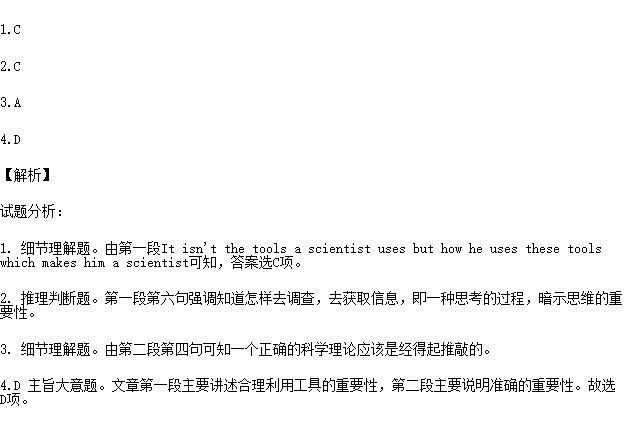题目内容
阅读理解。
What makes a person a scientist?Does he have ways or tools of learning that are different from those of others?The answer is “no”.It isn't the tools a scientist uses but how he uses these tools which makes him a scientist.You will probably agree that knowing how to use a power is important to a carpenter.You will probably agree,too,that knowing how to investigate,how to discover information,is important to everyone.The scientist,however,goes one step further;he must be sure that he has a reasonable answer to his questions and that his answer he gets to many questions is into a large set of ideas about how the world works.
The scientist's knowledge must be exact.There's no room for half right or right just half the time.He must be as nearly right as the conditions permit.What works under one set of conditions at one time must work under the same conditions at other times.If the conditions are different,any changes the scientist observes in a demonstration must be explained by the changes in the conditions.
This is one reason why investigations are important in science.Albert Einstein,who developed the Theory of Relativity,arrived at this theory through mathematics.The accuracy of his mathematics was later tested through investigation.Einstein's ideas were proved to be correct.A scientist uses many tools for measurements.Then the measurements are used to make mathematical calculations that may test his investigations.
1.What makes a scientist according to the passage?
A.The tools he uses. B.His ways of learning.
C.The way he uses his tools. D.The various tools he uses.
2.“…knowing how to investigate,how to discover information,is important to everyone.”The writer says this to show_______.
A.the importance of information
B.the difference between scientists and ordinary people
C.the importance of thinking
D.the difference between carpenters and ordinary people
3.A sound scientific theory should be one that_______.
A.works under one set of conditions at one time and also works under the same conditions at other times
B.leaves no room for improvement
C.doesn't allow any change even under different conditions
D.can be used for many purposes
4.What is the main idea of the passage?
A.Scientists are different from ordinary people.
B.The Theory of Relativity.
C.Exactness is the core of science.
D.Exactness and way of using tools are the keys to making of a scientist.
 天天向上一本好卷系列答案
天天向上一本好卷系列答案 小学生10分钟应用题系列答案
小学生10分钟应用题系列答案
